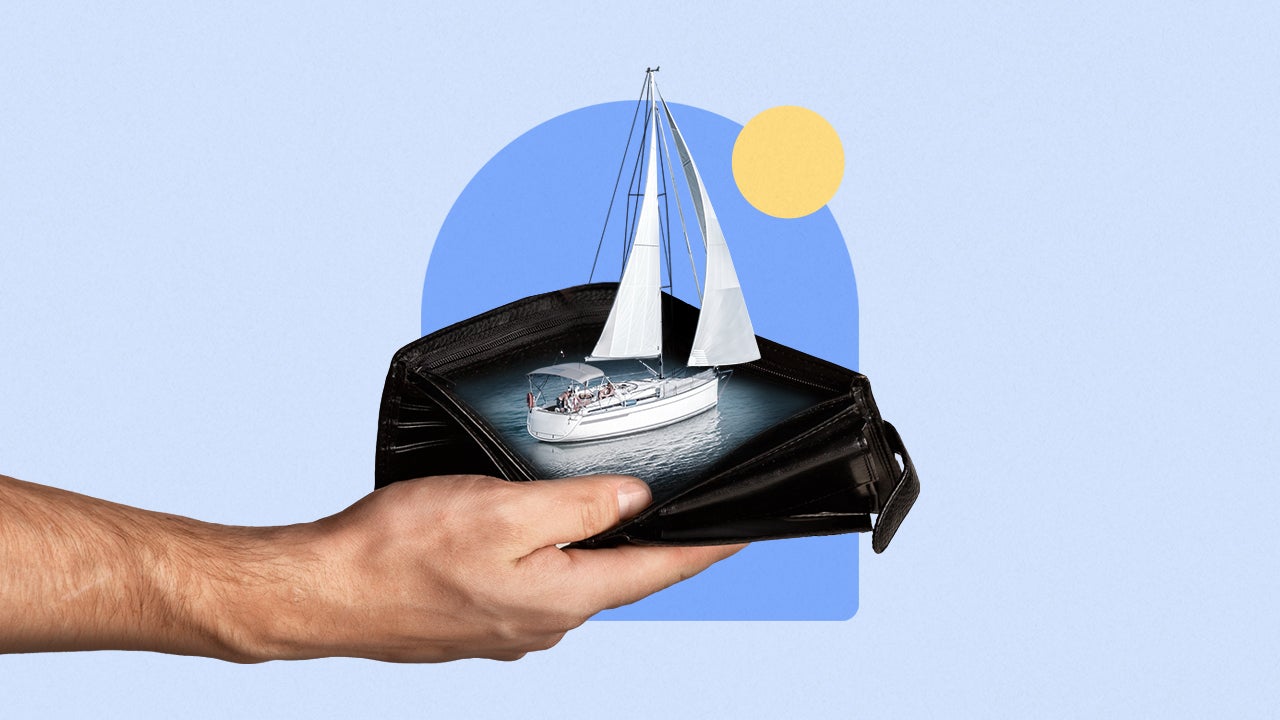Should I buy a boat or rent one? Consider these factors

Key takeaways
- Renting is a good option for testing options and infrequent trips on the water.
- Buying is best if you boat frequently and understand the maintenance costs.
- On average, owning a boat costs anywhere from $3,000 to $7,500 per year, plus the cost of a potential boat loan.
If you want to join the millions of Americans who go boating each year, you may be considering whether you should rent or buy a boat. Due to the wide range of boat sizes and types, price points for renting and buying vary greatly.
Both renting and buying boats have their pros and cons, so consider your long-term boating goals, your lifestyle and your budget when comparing options.
Should I rent a boat?
If you don’t plan to use it often, renting a boat is cheaper. If you’re thinking about buying a boat but aren’t sure what you want, renting can be a great way to get familiar with different kinds of boats and decide whether you like the boating lifestyle.
By renting, you get to enjoy a boat for a day or two without the commitment of day-to-day maintenance and overall upkeep.
Websites like GetMyBoat or Boatsetter are easy ways to find boat rentals in your area. Many rental companies require you to complete a brief training session before you rent. It may seem inconvenient, but you’ll need to be licensed to operate a boat in most states, anyway.
Because there are many types of boats, from small fishing boats to yachts and catamarans, rental prices vary greatly. You can expect to pay at least $125 an hour for a boat rental, and many include a two- to three-hour minimum rental. Some cost thousands of dollars per day, reaching as high as $10,000 for a luxury yacht.

Advantages of renting a boat
- Try out different boat types: When you rent, you aren’t committed to one boat or even a specific type of boat. You can rent a speedboat one day and test out a pontoon the next.
- No long-term commitment: You don’t have to hit the water a certain number of times to feel that buying was worthwhile. Go out for a few hours, and if you like it, you can always rent the boat again.
- No upkeep or maintenance: Arguably the best part about renting is that you don’t have to fix anything or figure out where to store the boat when you’re not using it.

Disadvantages of renting a boat
- More expensive over time: Renting a boat once or twice is far cheaper than buying one, but the fees can add up quickly if you plan to rent frequently. Buying a boat may be the most cost-effective option if you plan to get out on the water often.
- The boat may not be in tip-top condition: Whether you rent through a boat rental company or a peer-to-peer rental service, you don’t have control over the condition of the boat. Make sure you read reviews of any company you plan to rent a boat from.
- You have less freedom: Every rental company restricts where you can go or what you can do in the boat. For example, you may not be allowed to water ski or go tubing with a boat rental.
Should I buy a boat?
If you understand all the costs of owning a boat, and it fits comfortably within your budget, owning instead of renting a boat might be right for you.
Buying a boat comes with perks. You always have a fun place to hang out on the water and take it out whenever you want. There are more than 11 million registered boats in the U.S., so this is a popular choice.
Boat owners are also responsible for maintenance. This can take time and a lot of money. Boats can be expensive, so many buyers need to take out a boat loan. The price depends on the type of boat you choose and whether you buy it new or used.
If you want to buy a new boat, the average price is about $174,000, according to BoatGroup’s 2024 Midyear Report, but the exact amount you’ll spend varies significantly based on numerous factors.
For instance, boat size plays a major role in the purchase cost. Smaller boats, those less than 26-feet, may cost about $52,000 on average, while a 26-foot boat is about $91,000. At the opposite end of the spectrum, boats that range from 36 to 45-feet cost an average of $327,000.
Boat prices also vary based on the style of the boat. A pontoon boat may cost anywhere from $10,000 to $80,000, while a sail boat can cost as little as $5,000.

Advantages of buying a boat
- You can use it whenever you want: When you own a boat, you don’t have to plan around the rental company’s schedule to take it out.
- You don’t have to book in advance: During peak seasons, you don’t have to worry about boats being unavailable.
- Customize your boat to your liking: The name, paint job and decor are all in your hands. Likewise, you won’t have to abide by a rental company’s rules for how the vessel can be used.
- Maintain the boat to your standards: You manage the boat’s upkeep and can easily track maintenance so you don’t have to wonder about its condition.

Disadvantages of buying a boat
- Boats are a money pit: Some boat owners joke that “boat” stands for “bust out another thousand.” All jokes aside, boats are expensive. Owners must pay for gas, maintenance, storage and off-season maintenance.
- More time off the water than on: According to the most recent Coast Guard data, the average U.S. boat is only operated 54 days a year. For the other 311 days, it sits idle. For some, this can lead to guilt about not using their boat enough.
- Value decreases over time: When you buy a house, your investment typically gains value. However, boats, like cars and other vehicles, lose their value over time.
5 questions to ask before buying a boat
You need to consider how you will store and overwinter your boat. Other factors to consider are the fuel cost, how much you will use it and the monthly payments when you finance it.
1. How much will annual maintenance and fees cost?
The average annual cost to own and maintain a boat is $5,000 to $8,000. Typically, this list includes:
- State taxes.
- Insurance.
- License and registration.
- Gas.
- Maintenance and repairs.
- Trailer and tow vehicle.
- Safety equipment and education.
- Navigation equipment.
- Docking fees.
- Winter storage.
This annual cost doesn’t include the monthly payment associated with a boat loan. Factor your loan alongside these other expenses when determining how much your boat will cost each year.
2. How will I handle the additional costs of boat ownership?
The upfront cost associated with buying a boat is only part of the expense you’ll need to be prepared for. There’s also ongoing maintenance, which is typically equal to about 10 percent of a boat’s purchase price. In other words, if you spend $40,000 on a boat, you can expect to pay about $4,000 a year in maintenance.
You’ll also need to pay for boat insurance, which is typically about 1 to 5 percent of the boat’s insured value.
3. Is there room in my budget for a boat loan?
Before making a significant purchase like a boat, it’s important to carefully review your monthly budget and assess how the expense will impact your cash flow and ability to comfortably make ends meet. Be sure to review your current debt payments, along with any other financial obligations you may have on a monthly basis and determine whether you can also accommodate a boat payment and associated maintenance costs.
Depending on the lender, you may also need to make a down payment of between 10 and 30 percent of the total loan amount for a boat. This can impact your cash on hand, so be sure to consider all of these factors carefully.
4. Will I use the boat enough to justify the expense?
The answer to this question is different for everyone. But, if you’re like the average boat owner, you’ll use your boat for less than two months of the year. According to the U.S. Coast Guard, the average boat is only used 54 days a year. With a minimum maintenance cost of $3,000 per year, that breaks down to about $55 per day of use.
Depending on your budget, it may make more sense financially to rent a boat for specific occasions, especially if you’re thinking about only using your boat occasionally, such as during spring or summer. Although renting isn’t cheap, it will save you money on insurance costs, maintenance and other fees.
5. Where will I store the boat in the winter?
Since your boat won’t be used for several months during the winter, you need to prepare the vessel for inactivity. Standard steps include replacing the engine oil, draining the engine’s cooling water, stabilizing the fuel additive and replacing the gear oil. If you’re not able to perform these tasks yourself, winterizing your boat will be an added annual expense that could range from $150 to $600.
You will also need to account for storage. These are the most common options:
- Keep the boat in a slip at a marina and pay slip rental fees.
- Store it on a trailer at a self-storage facility or at home, if you have the space.
- Place it in dry dock storage at the marina.
Financing a boat
If you want to buy a boat but don’t have the cash needed to buy one, you may be able to get a boat loan or a personal loan. Talk to a local bank or online lender to find out their loan options for purchasing a boat.
In general, a boat loan works similarly to an auto loan. The boat will act as collateral for the loan, which can help keep interest rates down. If you are unable to repay the debt as agreed, the lender can repossess your boat.
If you opt for an unsecured personal loan, you won’t need to provide any collateral. However, it may be much more difficult to qualify for a loan amount and interest rate that can cover the cost of a boat without being too expensive.

Best boat loans of 2025
If you need to finance your boat purchase, consider Bankrate's picks for the best boat loans.
Learn moreBottom line
Boats are expensive, and as a result, most buyers will require financing. Weigh the pros and cons of buying a boat versus renting before you decide how you will get out on the water. And remember: renting a boat before buying can help you narrow down your options and test out life on the water.
Once you decide on how you want to enjoy boating life, make a plan. If you decide to rent, compare popular apps and local options. If you buy a boat, determine how much money you need to budget. Then, if needed, you can look into financing options and choose a lender.
Why we ask for feedback Your feedback helps us improve our content and services. It takes less than a minute to complete.
Your responses are anonymous and will only be used for improving our website.
You may also like

Should I buy a house now, or wait?

How much does a boat cost to purchase and own?




